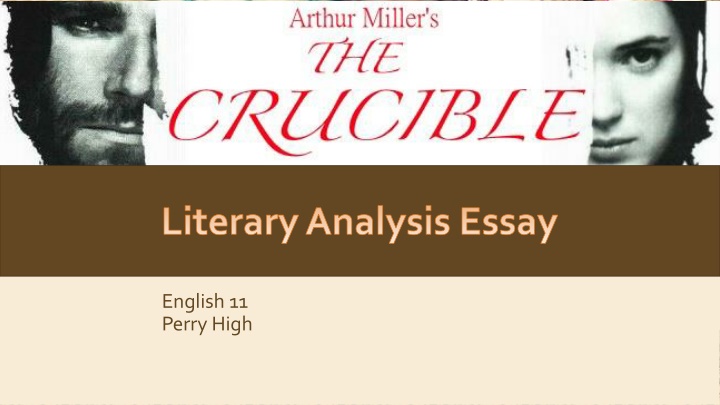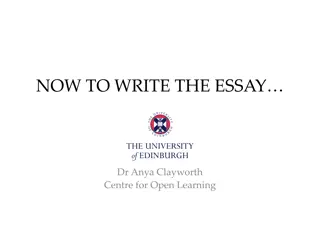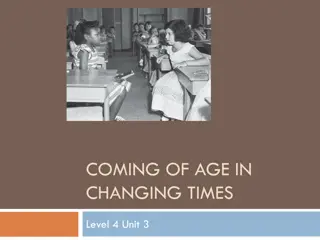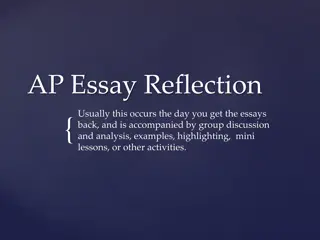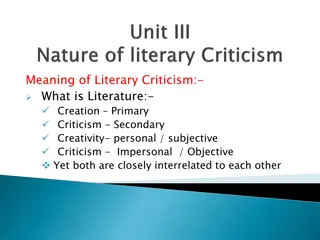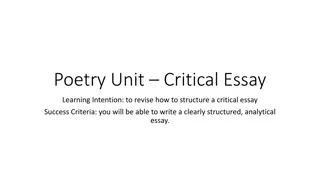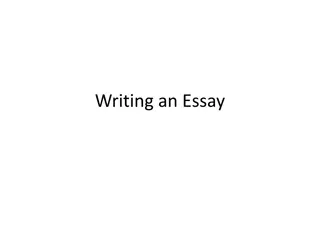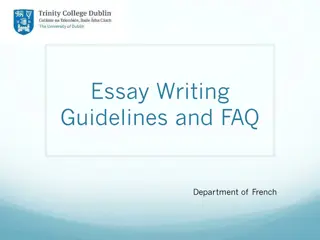Literary Analysis Essay
Delve into the theme of reputation in Arthur Miller's play, The Crucible, analyzing how characters prioritize protecting their reputations, even at great costs. Uncover the significance of reputation as a reflection of one's standing within the community and church.
Download Presentation

Please find below an Image/Link to download the presentation.
The content on the website is provided AS IS for your information and personal use only. It may not be sold, licensed, or shared on other websites without obtaining consent from the author.If you encounter any issues during the download, it is possible that the publisher has removed the file from their server.
You are allowed to download the files provided on this website for personal or commercial use, subject to the condition that they are used lawfully. All files are the property of their respective owners.
The content on the website is provided AS IS for your information and personal use only. It may not be sold, licensed, or shared on other websites without obtaining consent from the author.
E N D
Presentation Transcript
Literary Analysis Essay English 11 Perry High
Prompt: The Crucible has many underlying themes that drive the plot of the play and the dialogue of the characters. Using your notes on The Crucible, select one of the themes an analyze its meaning and how it is developed within the play.
Essay Requirements Introduction Paragraph Enticing Hook Brief background of the play Clear Thesis Body Paragraphs Topic Sentence Two well-developed SEE-sets (embedded textual evidence, MLA) Conclusion Sentence Conclusion Paragraph
Background of the Play Written in 1953, The Crucible is a play written by American playwright Arthur Miller. It is a work of historical fiction as it tells the story of the Salem witch trials 1692.
Themes in The Crucible Ambition: Being passionate about something can blind you from reality. At times, unchecked ambition can hurt you or others. Sometimes, well-intentioned passion can lead to unintended consequences. Mass Hysteria: Hysteria can push a person to do irrational things. Fear and ignorance can cause mass hysteria. Faithfulness: Undiscovered lies are more damaging than exposed lies. Many find it difficult to stay faithful to each other and to God. Giving in to our selfish desires leads to unfaithfulness.
Themes in The Crucible (Continued) Truth: Many people are afraid to tell the truth. The truth will set you free, but many are afraid of the consequences. Telling the truth often requires humility and transparency. Reputation: A person s reputation is very important. Having a good reputation means that you are a good citizen. A person s reputation shows how he/she is faithful to the community/church.
Thesis A theme in The Crucible that is evident is that a person s reputation is of utmost importance. Characters in the play work to protect their reputations regardless of the consequences.
Thesis One important theme in The Crucible deals with the truth. Although the truth will set you free, characters in The Crucible are afraid of the consequences of telling the truth.
Statement The characters in The Crucible were afraid to tell the truth because they would be placed in danger of being whipped, ridiculed and even executed.
Evidence For example, when Abigail was being questioned by Reverend Parris, she states [insert quote here] (I.26-32).
Explanation Abigail uses pretense (lies) to avoid telling the truth in an effort to stay out of trouble. But in the process, she puts others in even greater danger. The decision to lie and put others in danger stems from a desire to mitigate the consequences and from a theocracy that believes in the doctrine of divine will (all good comes from God and all evil from the devil).
